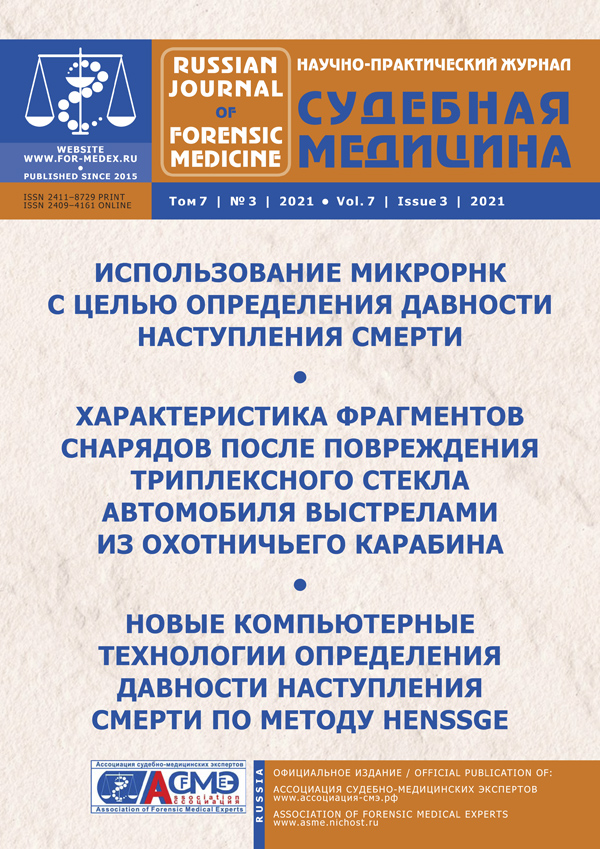Forensic medical determination of harm caused to human health in environmental crime cases
- 作者: Kuznetsov S.V.1,2, Molin Y.A.3,4, Melikhov S.Y.5
-
隶属关系:
- Russian State University of Justice
- Saint-Petersburg State Agrarian University
- North-Western State Medical University named aft er I.I. Mechnikov
- Bureau of Forensic Medical Examination
- Saint Petersburg Academy of the Investigative Committee of the Russian Federation
- 期: 卷 7, 编号 3 (2021)
- 页面: 186-192
- 栏目: 临床病例报告
- URL: https://journal-vniispk.ru/2411-8729/article/view/122462
- DOI: https://doi.org/10.17816/fm416
- ID: 122462
如何引用文章
全文:
详细
The article describes one of the most urgent needs of the investigation — the development of a fundamentally new approach to the forensic medical assessment of harm to human health caused by environmental crimes. Th e special signifi cance of new approaches to establishing a causal relationship between a committed environmental off ense and harm to life and (or) health, including for distinguishing from other possible anthropogenic impacts, is shown. A practical example of expert assistance to the investigation in establishing the circumstances to be proved during the investigation of an environmental crime is given.
作者简介
Semyon Kuznetsov
Russian State University of Justice; Saint-Petersburg State Agrarian University
编辑信件的主要联系方式.
Email: nachsml@mail.ru
SPIN 代码: 5122-0242
MD, Cand. Sci. (Med.), Assistant Professor
俄罗斯联邦, 96, Moyka, St. Petersburg, 190000; St. PetersburgYuri Molin
North-Western State Medical University named aft er I.I. Mechnikov; Bureau of Forensic Medical Examination
Email: expertfm@mail.ru
SPIN 代码: 7439-0540
MD, Dr. Sci. (Med.), Professor
俄罗斯联邦, 96, Moyka, St. Petersburg, 190000; St. PetersburgSergey Melikhov
Saint Petersburg Academy of the Investigative Committee of the Russian Federation
Email: msy@skspba.ru
SPIN 代码: 9043-1411
Cand. Sci. (Legal)
俄罗斯联邦, 96, Moyka, St. Petersburg, 190000参考
- Clifford M, Edwards T. Environmental crime. Edition: 2nd Publisher: Jones and Bartlett Learning; 2011. 448 p.
- Shover N, Routhe AS. Environmental crime. In: Crime and Justice: A review of research. Tonry M., ed. University of Chicago Press, Chicago. 2005;32:321–371.
- Walker T, Gramlich D, Bitar M, et al. Ecological, societal, and technological risks and the financial sector. Cham: Springer International Publishing; 2020. 464 p.
- The Constitution of the Russian Federation (adopted by popular vote on 12.12.1993 with amendments approved during the all-Russian vote on 01.07.2020). (In Russ). Available from: http://www.consultant.ru/document/cons_doc_LAW_28399/. Accessed: 28.07.2021.
- The Criminal Code of the Russian Federation from 13.06.1996 N 63-FZ (ed. from 01.07.2021). Article 2954. (In Russ). Available from: http://www.consultant.ru/document/cons_doc_LAW_10699/. Accessed: 28.07.2021.
- Ivanov NG. Criminal law. Special part in 2 vol. Vol. 2: textbook for academic bachelor’s degree. 2nd ed., revised and updated. Moscow: Yurayt; 2017. 241 p. (In Russ).
- Resolution of the Plenum of the Supreme Court of the Russian Federation No. 21 of October 18, 2012 «On the application by courts of legislation on liability for violations in the field of environmental protection and nature management». (In Russ). Available from: https://www.garant.ru/products/ipo/prime/doc/70146708/. Accessed: 28.07.2021.
- Letter of the Ministry of Natural Resources of the Russian Federation dated 27.12.1993 N 04-25/61-5678 «On the procedure for determining the amount of damage from land pollution with chemicals». (In Russ). Available from: http://www.consultant.ru/document/cons_doc_LAW_5189/. Accessed: 28.07.2021.
- Gubaidullin MG. Petrova AV, Ploskov DYu. Methodology of step-by-step biological recultivation of oil-contaminated soils and soils at oil depots in the Northern part of Russia. Environmental Protection in the Oil and Gas Complex. 2012;(6): 15–20. (In Russ).
- Nazarov AV. The influence of oil pollution of the soil on plants. Bulletin of the Perm University. 2007;(5):134–141. (In Russ).
- Pisarchuk AD. Ecological and microbiological aspects of bioremediation of oil-polluted ecosystems and coal pits [dissertation abstract]. Tomsk; 2014. 23 p. (In Russ).
- Moskovets AV. The use of hard-to-recycle waste from the petrochemical industry in the production of environmentally friendly building materials [dissertation abstract]. Ufa; 2016. 24 р. (In Russ).
- Shchetneva YaA. The impact on the environment of fuel and lubricants spills during logging operations. Studarctic Forum. 2016;1(1):28–33. (In Russ).
- Davydova SL, Tagasov VI. Oil and petroleum products in the environment: a textbook. Moscow: Peoples’ Friendship University of Russia Publishing House; 2004. 163 p. (In Russ).
- Spirkin VG. Chemmotology of fuels: a textbook. Ed. by I.G. Fuchs. Moscow: Neft’ i Gaz; 2002. 280 p. (In Russ).
- Polozkov VT, Goncharyuk VA, Egorov VN, et al. Labor protection at oil refineries and petrochemical plants. Moscow: Khimiya; 1973. 296 p. (In Russ).
- Eshenkulova AS. Indicators of the micronuclear test in persons in contact with petroleum products. Vestnik of KSMA named after I.K. Akhunbaev. 2016;(4):47–49. (In Russ).
- Glazov GI, Sidorin VP. Catalytic reforming and extraction of aromatic hydrocarbons. (Young Worker’s Library). Moscow: Khimiya; 1981. 188 p. (In Russ).
- Rules on labor protection during the operation of main oil product pipelines POT RO 112-002-98 (approved by Order of the Ministry of Fuel and Energy of the Russian Federation No. 208 of June 16, 1998). (In Russ). Available from: https://base.garant.ru/70490848/. Accessed: 28.07.2021.
- Usanovich SA, Kurmanov VV. Assessment of injuries and morbidity when working with petroleum products. Design, Use and Reliability of Agricultural Machinery. 2006;(1):5–6. (In Russ).
- Order of the Ministry of Health and Social Development of the Russian Federation No. 194n dated April 24, 2008 «On approval of Medical criteria for determining the severity of harm caused to human health». (In Russ). Available from: https://base.garant.ru/12162210/. Accessed: 28.07.2021.
- Melnikova IP. First aid in case of chemical poisoning: methodological recommendations (for practical classes). Vladivostok: Admiral G.I. Nevelsky Maritime State University; 2009. 59 p. (In Russ).
- Kuznetsov SV. Methodology of expert support for the investigation of crimes on the facts of improper provision of medical care: monograph. 2nd ed., revised and updated. Moscow: Rusains, 2021. 350 p. (In Russ).
补充文件







